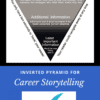
If your goal is to get a new job, here are 7 things you need to do to prepare yourself for your job search.
1. Update your résumé. While ideally your résumé is customised for a specific job, having an up-to-date résumé targeted for a specific “type” of position is the next best thing. So if you’ve taken on additional responsibilities in your current job, or you’ve changed your job target, or you’ve added new training or educational credentials, now is the time to talk with your résumé writer about updating your résumé. (And if you don’t have a résumé at all, now is definitely the time to put one together! A professional résumé writer can help!)
2. Develop — or update — your LinkedIn profile. A LinkedIn profile doesn’t replace the résumé…it complements it. Someone looking for a candidate with your skills and experience might conduct a search on LinkedIn and find your profile. Or, someone in your network might be interested in recommending you, and forward your LinkedIn profile URL. So make sure you have a LinkedIn profile — and make sure that it’s updated. (Yes, this is something your résumé writer can help you with.)
3. Know what you’re worth: conduct salary research. One of the most often-cited reasons to consider a job search is to increase your salary. But how do you know what you’re worth? There is more salary research data available than ever before. Websites like Glassdoor.com and Salary.com can help you see how your current salary and benefits package stacks up.
4. Build your network. It’s estimated that 40-80 percent of jobs are found through networking. Networking effectiveness is not just about quality — although that’s important. It’s also about quantity. It’s not just about who you know. It’s about who your contacts know. Many times, it’s the friend-of-a-friend who can help you land your dream job. Grow your network both professionally and personally. You never know who will be the one to introduce you to your next job opportunity.
5. Manage your online reputation. More and more hiring managers are checking you out online before they interview you. What will they find when they type your name into Google? How about if they check out your Twitter profile? Or find you on Facebook? Now is the time to conduct a social media assessment and clean up your online profiles.
6. Define your ideal job. “If you don’t know where you’re going, any road will get you there.” That line, from Alice in Wonderland, is important to remember in your job search. If you don’t know what your dream job looks like, how will you know how to find it? What job title and responsibilities are you interested in? Do you want to work independently, as part of a team, or both? Do you like short-term projects or long-term projects? Who would you report to? Who would report to you? Answering these questions can help you define your ideal position.
7. Create a target list of companies you’d like to work for. Like your ideal job, you probably have a preference for the type of organization you want as your employer. Things to consider include: company size, industry, culture, location, and structure (public, private, family-owned, franchise, nonprofit, etc.). Once you’ve made your list, look for companies that fit your criteria.
Need help? At Total Resumes, we create brand-driven, achievement-focused documents for executives and aspiring leaders worldwide. With a 98% client interview-winning success rate, we are well-placed to help with your career advancement. Check some of our work here: https://www.totalresumes.com.au/samples-of-our-award-winning-work/

